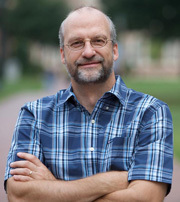The University of Notre Dame’s Science of Generosity Initiative has awarded $1.4 million to nine research projects that will study the origins, manifestations and consequences of generosity. The winning projects were chosen from among 327 proposals by scholars in numerous disciplines in this second phase of research funding. Four projects were funded earlier this year.

“In two rounds of competition, we received almost 700 research proposals, and these 13 projects gradually emerged as the most scientifically rigorous and promising we have seen. They are led by top-notch researchers and address a variety of important questions from diverse perspectives. I’m certain that we will learn a great deal about generosity from their work,” says Christian Smith, William R. Kenan Professor of Sociology and director of the generosity initiative.
Established in 2009 with a $5 million grant from the John Templeton Foundation, Notre Dame’s Science of Generosity Initiative brings together the often disconnected and diverse approaches to generosity studies in order to study generosity in all its forms.

Among the projects recently funded are:
- “The Foundations of Marital Generosity,” by University of Virginia sociologist W. Bradford Wilcox, will explore the cultural and social sources of marital generosity inside and outside of the home among young married adults between the ages of 18 and 45. It will examine how beliefs and behaviors related to familism (i.e., a strong normative commitment to lifelong marriage and to faithfully fulfilling family obligations), religious faith, and gender in the United States influence the generosity of spouses toward one another in marriage and toward others outside their families.
- “The Neural Circuitry Underlying Altruistic Behavior,” by Stephanie Brown, assistant professor in the department of preventive medicine, State University New York, Stony Brook, will examine how altruistic behavior engages a suite of cognitions, emotions and neurophysiological circuitry that amount to a caregiving behavioral system that motivates parental and other forms of caretaking behavior.
- “Does Microfinancing Promote Generosity?” by Rohini Pande, the Mohammed Kamal Professor of Public Policy at the Harvard University Kennedy School. Pande will evaluate the impact of an influential development program—microfinance—on generosity in poor communities. The research on this project will provide evidence on how the introduction of microfinance affects the level of generosity in poor rural communities.
Learn More >
Originally published at newsinfo.nd.edu.


